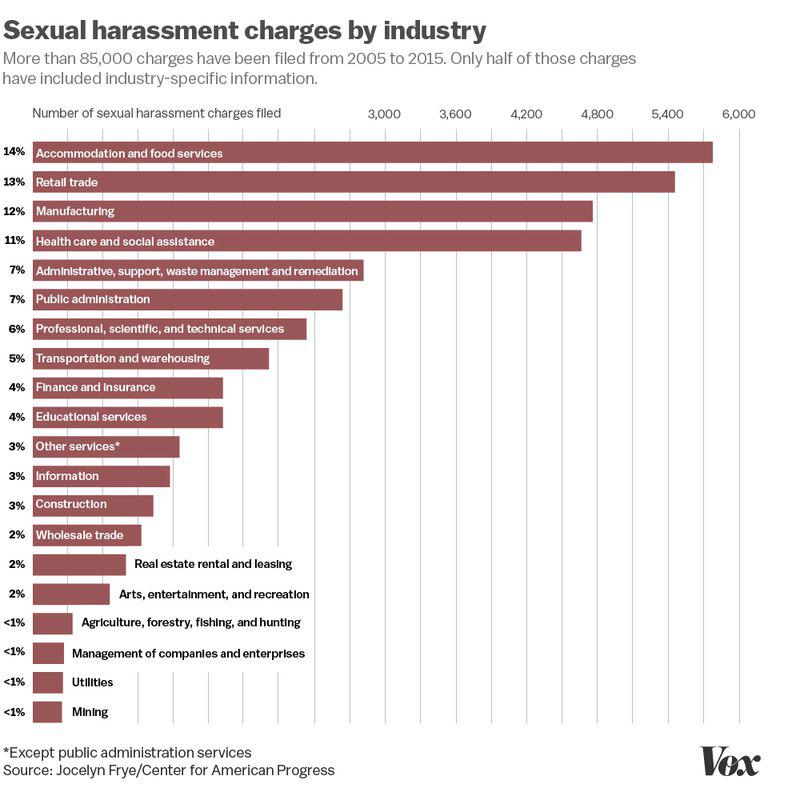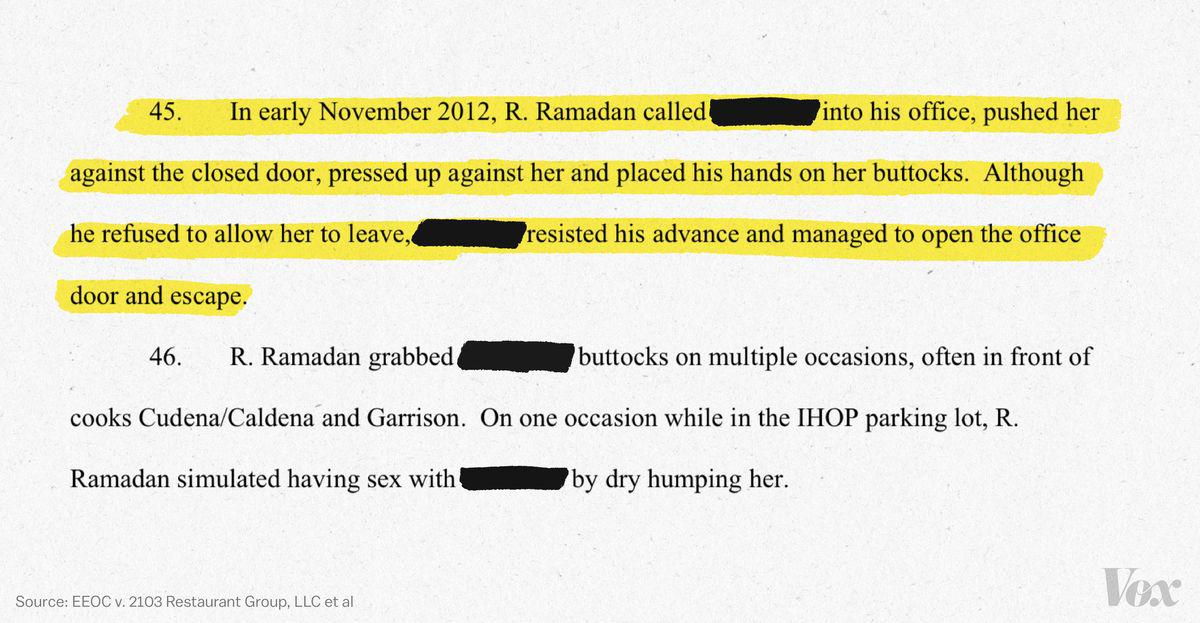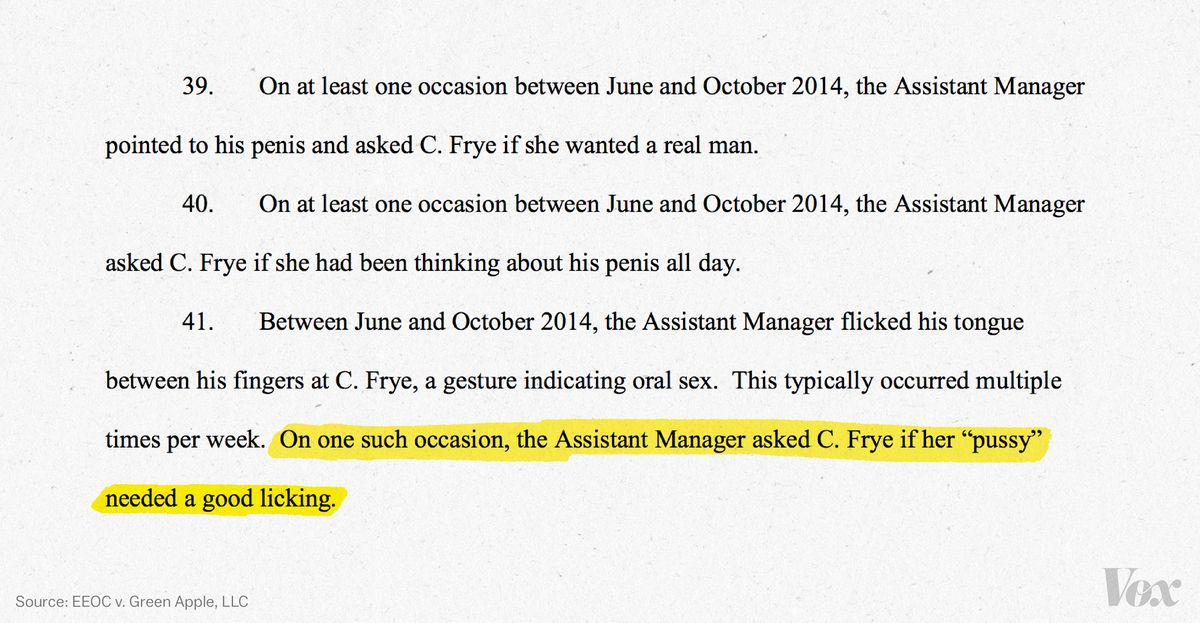|
More than 60 women have filed sexual harassment complaints against IHOP, Applebee’s restaurants
By Alexia Fernández Campbell
They describe a work environment where groping and sexual requests from co-workers were rampant. In late 2011, a 16-year-old girl from suburban St. Louis landed her first job as a waitress at a local IHOP restaurant. She needed to work there for at least a year to complete her high school co-op program. At first, it made her uncomfortable when her boss repeatedly complimented her appearance. Within a few months, his behavior made her terrified to go to work. The Illinois teen's fear of getting fired — and not graduating on time — led her to put up with escalating sexual harassment from the restaurant's general manager, according to allegations described in federal court documents filed in September. At one point, the manager allegedly threatened to "get violent" if she didn't have sex with him. Ten of the waitress's female co-workers described similar experiences with two male cooks at the restaurant in a sexual harassment lawsuit they filed together in September 2017 against the IHOP franchise owner. They all accused the general manager and other supervisors of ignoring their complaints — and even condoning the behavior in some cases. Those complaints were just a few of the nearly 7,000 sexual harassment reports against employers that were reviewed in 2017 by the US Equal Employment Opportunity Commission (EEOC), which enforces federal civil rights laws. Sexual harassment at work is a form of illegal gender discrimination under Title VII of the Civil Rights Act. The women each filed a separate EEOC complaint, and the EEOC decided to file a class-action lawsuit on their behalf. Sexual harassment is a particularly serious problem in restaurant and hotel jobs. From 2005 to 2015, hotel and restaurant workers filed at least 5,000 sexual harassment complaints with the EEOC — more than any other industry, according to an analysis from the Center for American Progress. This number represents only a fraction of all complaints filed by restaurant workers, as only about half of the 85,000 sexual harassment complaints filed with the EEOC in that time frame designated a specific industry. In the wake of #MeToo, the restaurant industry has been forced to grapple with the hostile work culture that has flourished in American dining establishments, with high-profile chefs like Mario Batali and John Besh brought down by allegations of sexual misconduct. But the movement has yet to sweep into the less glamorous, lower-paid sectors of the restaurant industry — family and chain restaurants that millions of Americans visit each year. Workers in these low-paying restaurant jobs are often teenagers or adults struggling to pay their bills, making them easy targets for abuse, says Laura Palumbo, communications director for the National Sexual Violence Resource Center. "It may be suggested that they are very replaceable; that because of their status in the workplace, no one will care about their claim or their claim won’t make a difference," she says. That's exactly what more than 60 workers at IHOP and Applebee's restaurants in eight states have reported since 2010, according to sexual harassment lawsuits filed in federal court. These were the two restaurant chains with the highest number of federal sexual harassment lawsuits during that time — four each. Though both restaurant brands are owned by the same company, the lawsuits were filed against individual franchise owners. Women who worked at these restaurants described toxic work environments where female servers said they are expected to tolerate aggressive groping and sexual requests from their co-workers as part of the job. When they complained, supervisors allegedly ignored them or told them to put up with it. Two federal lawsuits are pending against IHOP restaurants in New York, Illinois, and Nevada. Another lawsuit in New Mexico was settled, and another — against an Alabama IHOP — was moved to arbitration. Two lawsuits are pending against Applebee's restaurants in South Carolina and New York. Two others, in North Dakota and Florida, were settled. There were more than 1,600 IHOP restaurants in the United States as of 2016, and nearly 1,900 Applebee’s restaurants as of 2015. More than 60 women have complained about harassment at IHOP and Applebee's restaurants since 2010Restaurant workers — like all private sector employees — first have to file a complaint with the EEOC to seek legal remedies in federal court. The details of these workplace complaints are confidential, and are often mediated and settled privately with employers. If both parties can’t reach an agreement, then victims can take their cases to court (though very few do). In particularly egregious cases with well-documented evidence, the EEOC will file a lawsuit on a worker's behalf. Once a sexual harassment case goes to federal court, the records become public. Vox reviewed more than 450 gender discrimination lawsuits filed since 2010 in federal courts across the United States. The court system does not break down the number of discrimination lawsuits related to sexual harassment, or specifically against restaurants. But Vox found that IHOP and Applebee's were the only restaurant chains sued at least four times for sexual harassment. (Our review does not include lawsuits that have been filed in state courts for violations of state sexual harassment laws. It also doesn’t include claims against restaurants that require workers to sign mandatory arbitration agreements, which essentially bars workers from suing their employers and instead forces them to resolve disputes privately. This is a common practice at America’s largest restaurant franchises, including Waffle House, Hooters, Olive Garden, and Red Lobster. That's one reason why so few sexual harassment cases end up in federal court.) In September of last year, the EEOC sued the owners of two IHOP restaurants in Illinois on behalf of 11 female employees and one male employee. One of the targets of the suit was the owner of the IHOP where the high school student worked in Glen Carbon, Illinois, a suburb of St. Louis, Missouri. (Vox is not naming the teen because she was a minor when the harassment allegedly happened, and because she declined to talk to Vox about her case.) A few months after she was hired in December 2011, the restaurant’s general manager, Rami Ramadan, allegedly began telling her and other female servers “that they were sexy and their pants looked good.” The teen claims that she asked him to stop, but he didn’t. Instead, she says, he began pressuring her to have sex with him. When she refused, he reportedly got angry. “Don’t make me get violent babe, and take what I want,” he texted her, according to court documents. “Or we can meet and have sex somewhere that would be fun”; “I wasn’t asking, I was telling your [sic]”; and “Your [sic] going to cooperate one way or the other.” Around Thanksgiving in 2012, Ramadan allegedly grabbed the girl from behind and put his arms around her. When she told him to stop and tried to get away, he allegedly put a steak knife to her throat and told her that he didn’t like to hear “no.” He then released her. Her co-workers reported similar experiences with two cooks at the restaurant. They said the cooks grabbed their buttocks and breasts, and one tried to put his hand down one waitress’s pants. When they complained to Ramadan, they say, he did nothing. In one case, a waitress recalled that he told her, “That’s just how they play.” They also complained to another general manager, who allegedly told one woman “to suck it up.” Several women decided to quit. At a nearby IHOP in Alton, Illinois, a male cook claims he was also targeted. He accused the general manager of grabbing his buttocks and crotch multiple times. He also claims that the manager called and texted him and ignored the cook’s pleas to stop. Both Illinois IHOP franchises are owned by Khalid Ramadan, the brother of general manager Rami Ramadan. The lawsuit is pending in the US District Court for the Southern District of Illinois. The Ramadans did not respond to requests for comment from Vox. Philip Graham, an attorney representing Khalid Ramadan’s businesses, wrote in an email, ”We do not comment on pending litigation in the media, except to note that at this point the claims made are only allegations, which the defendants intend to defend vigorously in court.” Two days after filing the lawsuit against Ramadan’s franchises, the EEOC filed another complaint against the owners of seven IHOP restaurants in New York and Las Vegas. In the lawsuit, workers described a restaurant environment in which managers condoned sexual harassment of female servers and hosts and “frequently laughed off complaints.” In most cases, women who complained say they got fewer shifts. One waitress at an IHOP in Las Vegas said managers and cooks called her vulgar names, touched her buttocks, made comments about her genitals, and asked her for sex. She said the general manager not only ignored her complaints but told her to have sex with the cooks if she wanted them to treat her better. She claims the manager then gave her fewer shifts. Other waitresses at Las Vegas IHOP restaurants said cooks would follow them into the restaurants’ walk-in refrigerators and pantries to grope them. One woman, who struggled to get away, was so distraught that she ran outside to her car and locked herself inside. She said when she complained to her supervisor, nothing happened. Another target of EEOC action is Applebee’s. In May 2017, the EEOC filed a lawsuit against the owners of a franchise in North Myrtle Beach, South Carolina, on behalf of two waitresses. Tracy Frye said that her supervisor repeatedly came up behind her, grabbed both of her breasts, and rubbed his crotch against her during the 10 months she worked with him. She said he asked her several times for sex and once straddled her head between his legs when she was bent over cleaning. She said she complained to another assistant manager, and their general manager, but nothing happened. Tracy’s sister Cindy started working there too, and reported the same behavior. She asked the general manager not to assign her to work the same shifts as the supervisor — a request that the manager denied. It wasn’t until Cindy Frye’s husband found out about the incidents and confronted the general manager that the GM fired the supervisor, according to the plaintiffs' complaint. The lawsuit is currently pending in the US District Court for the Southern District of South Carolina. Amanda Nitto, a lawyer representing New Apple Inc., which owns the Applebee’s restaurant in North Myrtle Beach, declined to comment on the case. A private lawyer representing the Frye sisters never responded to Vox. Vox also reached out to six of the women who filed charges against the IHOP franchise owners. Four of them didn’t respond, and two of them declined to comment about their experiences. The EEOC attorneys representing them also declined to talk to Vox because the cases are still pending in court. All IHOP and Applebee's restaurants are independently owned, and the California-based corporation that owns both brands is not a defendant in the lawsuits. A franchise company can still be held liable for sexual harassment at its independently owned chains, but those cases are harder to prove, says Kelly Armstrong, an employment law attorney in San Francisco who specializes in gender discrimination cases. Plaintiffs would have to show that the company was aware of the allegations and did nothing to stop or prevent harassment. Vox contacted DineEquity, the public corporation that owns the Applebee’s and IHOP franchises. Court records give no indication that the company was aware of the complaints against its IHOP and Applebee's franchisees. A spokesperson for DineEquity, Thien Ho, did not answer questions about whether the company knew of the allegations in the lawsuits. Instead, Ho released the following statement: A persistent problem in the restaurant industry The harassment described in these cases is hardly unique to IHOP and Applebee’s. It’s a persistent problem in low-paying, customer-service-oriented jobs like restaurants and retail, says Palumbo of the National Sexual Violence Resource Center. It's impossible to know the exact number of sexual harassment complaints filed against IHOP and Applebee's owners, because cases that are mediated through the EEOC (and therefore never make it to court) are never made public. The cases that the EEOC does take to court, like the ones detailed above, have a good chance of succeeding, according to experts. “Because the EEOC has limited resources, they want to take the most egregious cases forward so they have the highest chances of success,” says Armstrong, the employment law attorney in San Francisco. They often result in back pay and punitive damages for workers, and require employers to take steps to prevent future harassment. But even when the EEOC takes a case to federal court, it doesn’t always mean it will go before a jury. Research shows that employers are more likely to settle charges than risk a lengthy trial. That’s what happened in another Applebee’s case. The general manager of a restaurant in Bismarck, North Dakota, allegedly groped, asked for sex from, and exposed himself to 17 female employees on a regular basis. In at least one case, he forced a woman to give him oral sex in exchange for a raise, according to the complaint. Even customers complained about his behavior, yet nothing changed. The EEOC filed a lawsuit in 2010, and in 2011 the restaurant agreed to settle the case for $1 million, which went to the 17 victims. As part of the deal, the company that owned the restaurant had to implement a sexual harassment training and reporting system. “This case demonstrates in a rather emphatic way that sexual harassment is still a challenge for women at some of our best-known neighborhood businesses,” said John Rowe, the EEOC lawyer who investigated the case, in a statement at the time. That was six years ago. Based on the allegations in the most recent lawsuits against IHOP and Applebee’s restaurants, it remains a challenge. Contact: alexia@vox.com
|
.
Any original material on these pages is copyright © BishopAccountability.org 2004. Reproduce freely with attribution.


